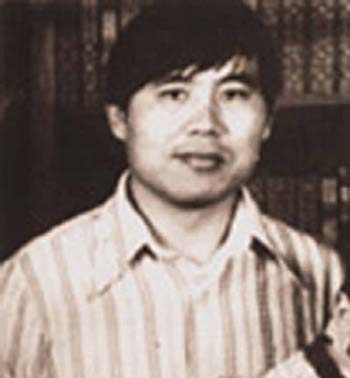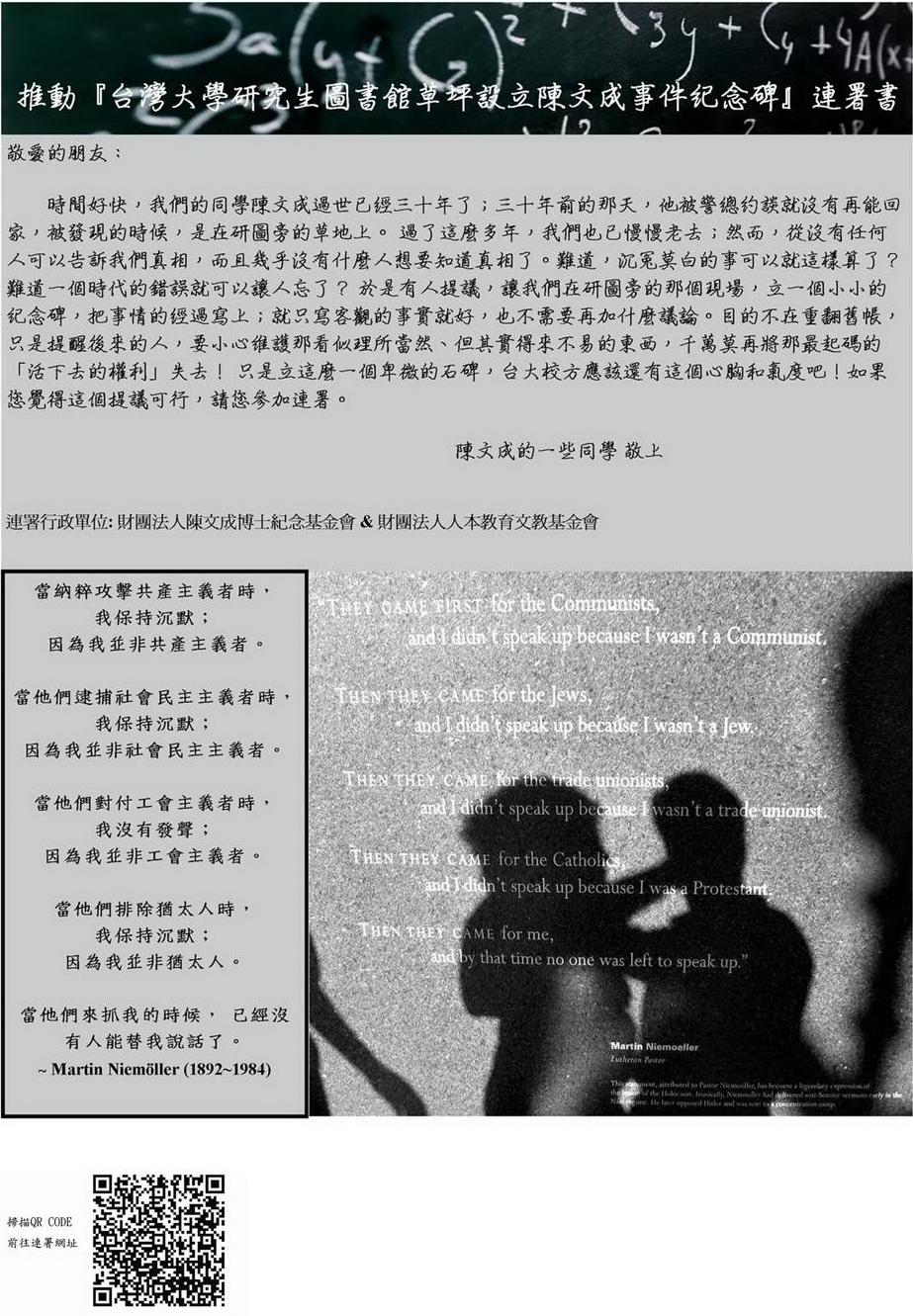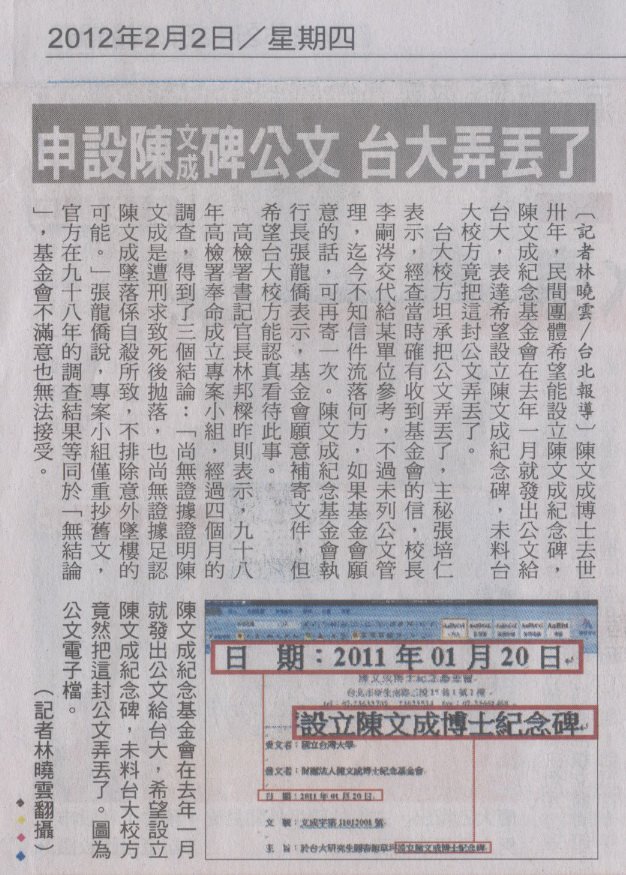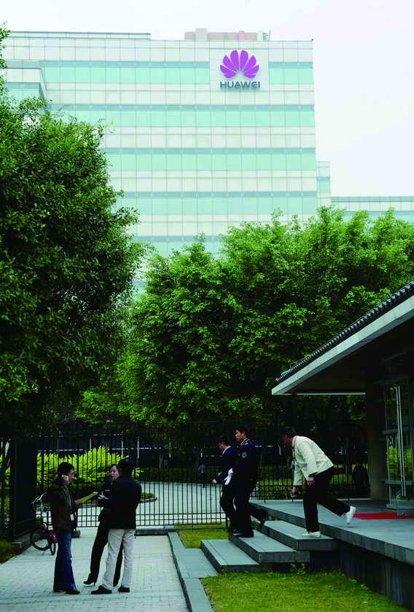力主扁案判決「自始無效」的士林地方法院庭長洪英花,一想到這個判決就心情沉重,她說「北院以庭長會議的行政手段,作成換法官決定,嚴重侵越審判獨立精神,根本就是違憲」。
Taipei Su-Lin District Court Chief Justice Hong Yin-Hua affirms that the verdict against former President Chen Shui Bian is “INVALID FROM THE START.” Her mood turns somber when she thinks of this verdict against President Chen. “Taipei District Court removed the presiding judge by an executive order based on the decision of a meeting among chief justices. This decision gravely violates the principle of judicial independence and is unconstitutional.” She said.
以下為記者訪談摘要 (Liberty Times)
Below is the summary of the Q&A between the reporter of Liberty Times and Judge Hong:
問: 妳為何提出扁案自始當然無效?
Q: “Why did you affirm that the verdict against President Chen is INVALID FROM THE START?”
答: 憲法第八十條明定審判獨立,是為了要建構公平的法院,不受到任何干涉;審判獨立的先決條件是法院受理案件時,這個案件要分給哪個法 官承辦,都須嚴格遵守法律規定,且 要符合個案隨機正義的要求。
只有經過法律決定、按照抽籤決定,抽出來的法定法官才有權力審理具體個案 的被 告. 法官蔡守訓所組的合議庭並不是法定法官. 合議庭無權審訊阿扁,更無權羈押阿扁,但合議庭不顧法官法定原則受到侵害,逕作實體判決,因此判決當然應該是 自始無效。
A: Article #80 of Taiwan Constitution stipulates the principle of judicial independence, which is essential to establish an impartial court system, not to be subject to external influences. One necessary condition for judicial independence is that the selection process of the presiding judge for an assigned case must be impartial and random. A presiding judge selected by this process is denoted as “legally assigned judge”.
Only and only if the legally assigned judge, who is selected through a legal and random draw process, has the judicial power to hear and determine the assigned case. Judge Tsai Sho-Shuin and the joint court he assembled is not the legally designated judge for the trial of President Chen. As a result, this joint court has no judicial power to conduct a bench trial of President Chen, let alone issuing rulings to place him under custody without bail. However, this joint court disregards this very principle of legally assinged judge and issues rulings unilaterally. Therefore, their verdict should be invalid from the start.
問: 請說明一下「法官法定」原則?
Q: Can you elaborate on the principle of “Legally Assigned Judge”?
答: 憲法明定審判要獨立. 憲法第十六條也規定保障人民有訴訟權, 強調須經由公 正、公開抽籤的程序, 才能落實訴訟權保障. 這是法官法定原則的核心價值。
以行政手段換法官違憲
北院以庭長會議的行政手段作成換法官的決定,把周占春改由蔡守訓,如此以法律外的因素交由蔡守訓合議庭審理, 已侵越審判獨立及人民訴訟權的保障,明顯違反憲法「法官法定」原則。
A: Constitution stipulates Independence of Judiciary. Article #16 of Constitution also provides constitutional litigation right. This Article emphasizes that in order to protect the constitutional litigation right, the selection process to assign a presiding judge must follow an impartial and open drawing procedure. This is the core value of the principle of legally assigned judge.
It is unconstitutional to remove the legally assigned judge through an executive order.
Taipei District Court removed the legally assigned judge Chou Chan-Tsun and installed Judge Tsai Sho-Shuin by an executive order based on the decision of a meeting among chief justices subject to external influences without abiding by the rule of law. This action has violated the principle of judicial independence and is unconstitutional against the litigation right. Thus, it clearly violates the principle of “Legally Assigned Judge”.
問: 所以妳在扁案偵審期間, 接連發表文章表達意見,有人質疑你的言論違反 「法官不語」。
Q: Some people questioned if you have violated “judicial lockjaw” because you repeatedly comment on the trial of President Chen.
答: 我是基於法律人對法律良知的堅持以及自始至終不變的執著,才不斷發聲。因為法治是國家治權的最後一道防線,司法正義崩 盤, 國家治權如何長治久安如何維繫,
法官不語其實是抽象的司法倫理規範,用意是在規範承辦具體個案的法官,除訴訟指揮權,以及依法官職權應 作、可以作的表達外,只要涉及個案利害相關事項,承審法官均不適宜作不當的發聲,以免影響訴訟結果。
扁案更換法官,產生違反法官法定原則的 分案爭議,侵犯憲法審判獨立,造成憲政危機。我發表文章是基於法律專業 的良知,是屬於法官言論自由的範疇,不能因有法官的身分就要被剝奪。
所以法官不語與言論自由,前者是司法倫理,後者為憲法人權,兩者不能混淆,尤其不能以法官不語的理由,箝制法官的言論自由。何況,美國憲法學者 ROBERT M.O’Neil認為 「公正和客觀的核心利益,並不會要求對於法院工作最具專業和最能 解惑的專家,必須保持沉默。」
A: As a person devoted to a career in law, I issued my public comments on this case because of my conscience and perseverance to uphold rule of law. Rule of law is the last defense to uphold an impartial judicial branch. Without it, the judicial justice will collapse and the judicial branch will not survive. “Judicial lockjaw”, which suggests a judge to abstain from public comments, is more an abstract behavior agreement than a requirement by law.
The reason for judicial lockjaw is to require a presiding judge to refrain from issuing improper statements directly related to the presiding case to influence the outcome of a trial unless the statements are related to issuing ruling or are allowed by law. I issued my comments on the trial of President Chen because of the dispute over the removal of the legally assigned judge, which has seriously violated judicial independence, leading to a constitutional crisis.
My public statements on this matter are within my right to free speech and originate from my conscience to uphold the rule of law. It is not appropriate to limit the right to free speech of a judge by citing “judicial lockjaw”. Robert M. O’Neil, an US constitution scholar, stated “in order to protect the core value of impartiality and objectiveness, we should not require those with profound legal expertise and skills for legal explanation to remind silent” (a translated quote, not an original quote).
問: 妳不斷為文呼籲,是否擔心遭抹黑?
Q: Are you concerned any slanderous attack due to your repeated public comments?
答: 我本著對法律的堅持站出來捍衛憲法價值, 我尊重不同聲音, 但若抹黑、中傷我, 我除透過司法途徑救濟外, 無 畏無懼, 會繼續捍衛民主憲政秩序。我深信真理越辯越明。法 律人不能陷入流派、意識形態之爭,就像我辦案不分黨派, 法官須是每一個被害人、被告權利的保護 者。
A: I speak up to uphold the value of Constitution due to my believe in rule of law. I respect different opinions. However, I will seek law protection against any malicious slanderous attack. I have no fear and will continue to fight for democracy and Constitution. I believe that truth will come to light through debate. As a career person in law, I cannot allow myself to be trapped in partisan and ideological disputes. I exercise impartial judicial discretion when I preside over trials. I believe that a judge must be a protector of the legal rights of every victim and defendant.
2009-09-16 Liberty Times




